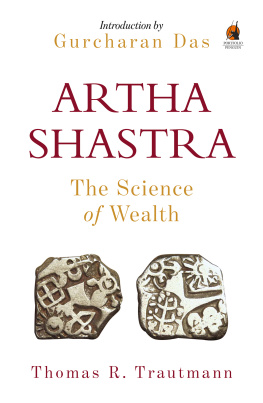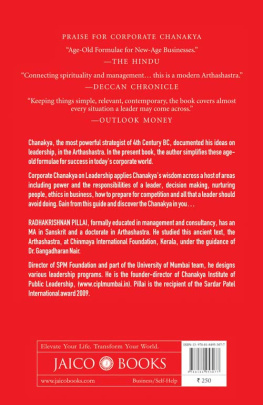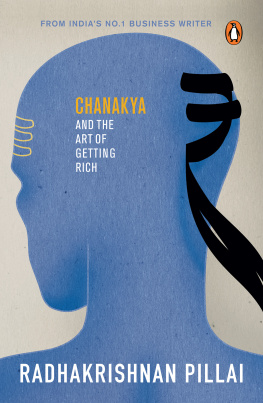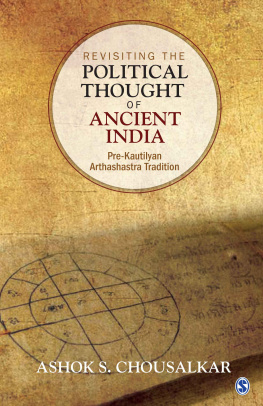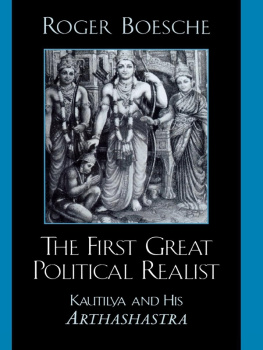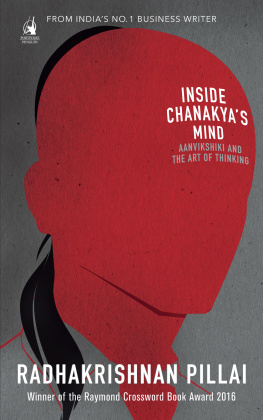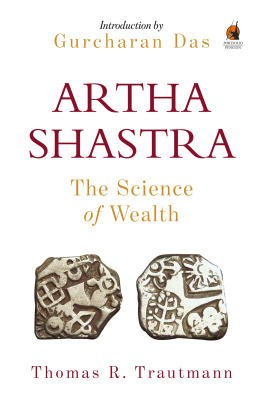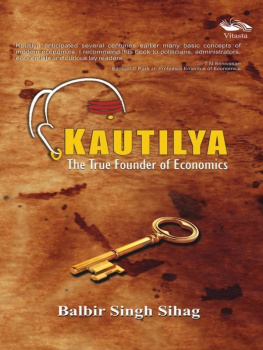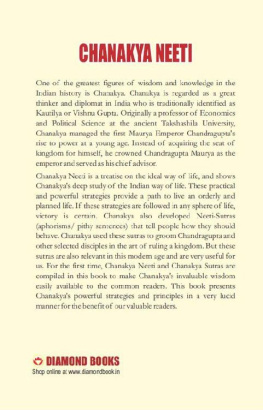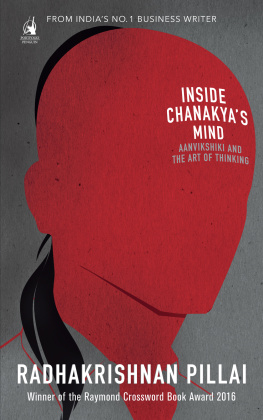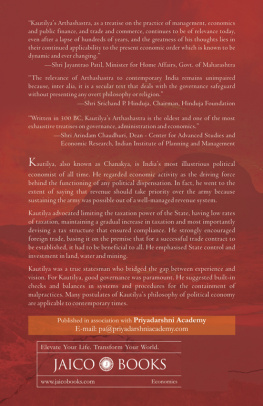THE STORY OF INDIAN BUSINESS
Arthashastra: The Science of Wealth by Thomas R. Trautmann
The World of the Tamil Merchant: Pioneers of International Trade by Kanakalatha Mukund
The Mouse Merchant: Money in Ancient India by Arshia Sattar
The East India Company: The Worlds Most Powerful Corporation by Tirthankar Roy
Caravans: Punjabi Khatri Merchants on the Silk Road by Scott C. Levi
Globalization before Its Time: Gujarati Traders in the Indian Ocean by Chhaya Goswami (edited by Jaithirth Rao)
Three Merchants of Bombay: Business Pioneers of the Nineteenth Century by Lakshmi Subramanian
The Marwaris: From Jagat Seth to the Birlas by Thomas A. Timberg
PORTFOLIO
ARTHASHASTRA: THE SCIENCE OF WEALTH
THOMAS R. TRAUTMANN is the author of Kautilya and the Arthashastra (1971) and other books on ancient India, including Aryans and British India (1997), The Aryan Debate (2005), Languages and Nations: The Dravidian Proof in Colonial Madras (2006) and India: Brief History of a Civilization (2010). He is professor emeritus of history and anthropology at the University of Michigan.
GURCHARAN DAS is a world-renowned author, commentator and public intellectual. His bestselling books include India Unbound and The Difficulty of Being Good; his newest book is India Grows at Night. A graduate of Harvard University, Das was CEO of Procter & Gamble India before he took early retirement to become a full-time writer. He lives in Delhi.
Introduction
In the happiness of his subjects lies the kings happiness, in their welfare his welfare. He shall not consider as good only that which pleases him but treat as beneficial to him whatever pleases his subjects.
Arthashastra, I.19.34
The story of Indian business
Since the Arthashastra is the worlds first manual in political economy, it is appropriate that Tom Trautmanns radiant study of this text is placed first in our multi-volume series. Our story of Indian business, based on a close examination of texts, is about the great business and economic ideas that have shaped commerce on the Indian subcontinent.
In this series, leading contemporary scholars interpret texts and ideas in a lively, sharp and authoritative manner, for the intelligent reader with no prior background in the field. Each slender volume recounts the romance and adventure of business enterprise in the bazaar or on the high seas along a 5,000-mile coastline. Each author offers an enduring perspective on business and economic enterprise in the past, avoiding the pitfall of simplistically cataloguing a set of lessons for today. The value of the exercise, if we are successful, will be to promote in the reader a longer-term sensibility, which can help understand the material bases for our present human condition and think sensibly about the future. Taken together, the Story of Indian Business series celebrates the ideal captured in the Sanskrit word artha, material well-being, which was one of the aims of the classical Indian life.
The books in this series range over a vast territorybeginning two thousand years ago with this volume on the ancient art of wealth and ending with the Bombay Plan, drawn in 194445 by eminent industrialists who wrestled with the proper roles of the public and private sectorsrecounted for us vividly by Medha Kudaisiya. In-between is a veritable feast. In addition to the Arthashastra, four sparkling volumes cover the ancient and the early medieval periodsGregory Schopen presents the Business Model of Early Buddhist Monasticism based on the Mulasarvastivada-vinya; Kanakalatha Mukund, drawing from the epics Silappadikaram and Manimekalai, takes us into the world of the Tamil merchant to the end of the Chola empire; Himanshu Prabha Ray transfers us to the maritime-trading world of the western Indian ocean along the Kanara and Gujarat coasts, using the Sanskrit Lekhapaddhati written in Gujarati; and Arshia Sattar recounts the brilliant adventures told in The Mouse Merchant and in other tales based on the Kathasaritsagara and other sources.
Scott Levi takes off into the early modern period with the saga of Multani traders in caravans through central Asia, rooted in the work of Zia al-Din Baranis Tarikh-i-Firuz Shahi and Jean-Baptiste Tavernier. The celebrated Sanjay Subrahmanyam and Muzaffar Alam transport us into the world of sultans, shopkeepers and portfolio capitalists in Mughal India. Ishan Chakrabarti traces the ethically individualistic world of Banarsidas, a Jain merchant in Mughal times, via his diary, Ardhakathanak. Tirthankar Roys elegant volume on the East India Company is our passage to the modern world, where the distinguished Lakshmi Subramaniam recounts the ups and downs in the adventurous lives of three great merchants of BombayTarwady Arjunjee Nathjee, Jamsetjee Jeejeebhoy and Premchand Raychand.
Anuradha Kumar adds to this a narrative on the building of railways in nineteenth-century India through the eyes of those who built them. Chhaya Goswami dives deep into the Indian Ocean to recount the tale of Kachchhi enterprise in the triangle between Zanzibar, Muscat and Mandvi. Tom Timberg revisits the bold, risk-taking world of the Marwaris and Raman Mahadevan describes Nattukottai Chettiars search for fortune. Vikramjit Banerjee rounds up the series with competing visions of prosperity among men who fought for Indias freedom in the early twentieth century via the works of Gandhi, Vivekenanda, Nehru, Ambedkar and others. The privilege of reading these rich and diverse volumes has left meone readerwith a sense of wonder at the vivid, dynamic and illustrious role played by trade and economic enterprise in advancing Indian civilization.
Arthashastra, property and the kings share
In this introduction I shall not go over the same ground as Professor Trautmanns graceful and authoritative work but focus instead on a few themes which provide context for his book and will hopefully enrich the experience of reading it. I shall confine myself to three issues: 1) Given that the notion of property is central to a market economy, it is worth asking the question: what was the status of private property and especially land tenure in the society of the Arthashastra? 2) What are the principles of leadership which emanate from the Arthashastra? Although these were intended as advice to a royal prince, I believe they are applicable to all political and business leaders. 3) Early in his book, Trautmann reminds us that artha, material well-being, is one of the three or four classical goals of life and it is subordinate to

